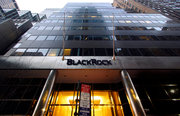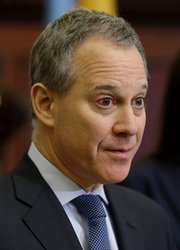|

Business Day
BlackRock Agrees to Stop Pursuing Nonpublic Views
By
GRETCHEN MORGENSON JAN. 8, 2014
BlackRock, the world’s largest asset management company, has
agreed to end its practice of surveying Wall Street analysts to glean
clues about their views on companies before those opinions are
publicly issued.
The decision was reached late
Wednesday as part of a settlement with
Eric T. Schneiderman, the New York attorney general. The
settlement document filed in the case contended that BlackRock’s
surveys “allowed it to obtain information from analysts that could
reveal forthcoming revisions to their published views” on companies
they followed. The firm will also pay $400,000 to cover costs of the
investigation.
“BlackRock deserves credit
for recognizing the need for reform when it comes to the dissemination
of information that can move markets,” Mr. Schneiderman said in a
statement. “Its decision to end its global analyst survey program and
cooperate with my office’s investigation into the early release of
Wall Street analyst sentiment is a major step forward in restoring
fairness in our financial markets and ensuring a level playing field
for all investors.”
|

BlackRock, with $4.1 trillion of assets under management, has used
analyst surveys for almost five years.
Mark Lennihan/Associated Press
|
|
Analysts’ changing
assessments on the public companies they follow can make a stock
plummet or soar, so receiving such information ahead of other
investors can be highly profitable for traders.
As a result, regulatory rules
require brokerage firms to limit the information flow from research
departments to prevent the potential for trading ahead of analyst
reports.
A spokesman for BlackRock,
James Badenhausen, said: “We are pleased to resolve this matter and
put it behind the company, paying the attorney general’s costs of the
investigation amounting to $400,000 but no fine or penalty. BlackRock
is committed to operating with the highest ethical standards. This
survey was initiated by Barclays Global Investors prior to its
acquisition by BlackRock. We have discontinued its use to avoid even
the appearance of any impropriety. The language cited by the attorney
general from several internal memos is totally inconsistent with the
standards by which BlackRock does business.”
In settling with the attorney
general, BlackRock neither admitted nor denied the allegations.
Black Rock, with $4.1
trillion of assets under management, has used analyst surveys for
almost five years. The surveys were the subject of
an article in The New York Times in July 2012.
According to internal
documents obtained by The Times and cited in the article, survey
questions included whether a company’s near-term profits “are more
likely to surprise on the upside or downside,” and “how likely is it
that the company will be taken over in the next six months?” Analysts
answering this question were asked to exclude transactions that had
already been announced.
Brokerage firms agreed to let
their analysts participate in the surveys, the attorney general’s
investigation indicated, in part because BlackRock is one of their
largest clients and generates enormous trading commissions for them
each year.
|

Eric Schneiderman, the New York attorney general, called the deal
a “step forward.”
Matt Rourke/Associated Press
|
|
The attorney general’s
investigation also concluded that BlackRock rewarded analysts who
participated in the surveys by assigning them higher ratings in
industry rankings, which enhanced the analysts’ careers, prominence
and potentially their paychecks.
The attorney general’s
investigation into the analyst surveys is continuing, the settlement
document said, with BlackRock’s help. The inquiry will examine other
money management firms that employ such surveys as well as the
brokerage firms whose analysts participate in them.
From March 2009 to January
2013, the attorney general’s document showed, BlackRock collected
60,000 analyst answers indicating a corporate earnings surprise,
either up or down. And for the year ending March 2010, BlackRock
collected almost 8,000 answers regarding potential acquisitions, the
attorney general’s investigation found.
Information gleaned from
these and other questions was fed into trading algorithms designed by
BlackRock’s Scientific Active Equities unit, a quantitative investment
group acquired when it bought Barclays Global Investors in 2009.
The attorney general has been
critical of institutions that dispense market-moving information
unevenly among investors, and he began investigating BlackRock’s
survey program after The Times article was published.
Another investigation led Mr.
Schneiderman to Thomson Reuters, a news organization that had been
providing market-moving information to some clients ahead of others.
Last July, Thomson Reuters agreed to stop giving high-frequency
traders who paid for the privilege an early look at consumer
confidence reports.
Throughout the investigation,
Mr. Schneiderman’s complaint noted, the firm contended that its
surveys were designed to tap only into information that had been
previously disseminated by the Wall Street analysts.
But both Mr. Schneiderman’s
settlement document and The Times article cited internal
correspondence indicating that firm officials hoped the analyst
surveys would provide “advance information.”
An internal BlackRock
document cited by the attorney general showed, for example, how the
firm planned to secure the freshest information from analyst
participants. BlackRock would distribute some surveys just before
periods when companies would be making quarterly earnings
announcements, the settlement document showed, letting the firm
capture analysts’ changing expectations of companies’ results only
days before earnings were to be announced.
A version of
this article appears in print on January 9, 2014, on page B1 of the
New York edition with the headline: BlackRock Agrees to Stop Pursuing
Nonpublic Views.
© 2014 The
New York Times Company |